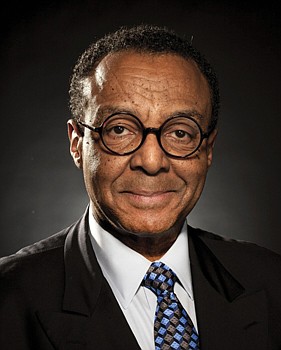Making America laugh, look at itself, by Clarence Page
1/4/2024, 6 p.m.
For many of us old enough to remember Archie Bunker’s living room chair before it became a Smithsonian Museum exhibit, Norman Lear helped television comedy get over its fear of real life.
Mr. Lear, who died Dec. 5 at the ripe young age of 101, wrote and produced “All in the Family” and many other shows that dared to mix political and social commentary with laughs and get away with it, scoring big ratings and armloads of awards along the way.
They also gave us a lifetime of memorable TV moments that still have old-timers declaring, “You had to be there.”
If you were there, as I was, you may well remember how the 1950s-style monoculture of “Ozzie and Harriet,” “Father Knows Best” and “Leave it to Beaver” was disrupted by the appearance of “All in the Family” in 1971— the early days of a decade that had yet to define itself culturally in the wake of the socially and politically turbulent 1960s.
The pilot signaled we were about to see something very different. Almost all the “action” takes place in the Queens home of Archie and Edith Bunker (played magnificently by Carroll O’Connor and Jean Stapleton), who share their working-class bungalow with their thoroughly ’60s-style daughter Gloria (Sally Struthers) and her husband, Mike (Rob Reiner), whom Archie uncharitably dubs “Meathead.”
Despite Gloria’s pleas to Mike before a Sunday brunch after church, “Promise no fighting with Daddy, OK?,” within moments, Mike and Archie get into it.
“You’re going to tell me that the Black man has had the same opportunity as you?” Mike declares incredulously to Archie.
“More, he’s had more!” Archie barks back. “I didn’t have no million people marching out there to get me my job.”
“No,” Edith helpfully interjects. “His uncle got it for him!”
Rewatching it on YouTube, I still guffaw over the scene. It was the sort of humor that comes directly from slices of real life that would later be labeled “politically incorrect.”
“All in the Family” soon won renown as the program unafraid to laugh at the sort of remarks that in the real world might bring a curtain of uncomfortable silence down over the room, especially in mixed company.
In those bygone days of dominance by only three networks, “All in the Family” sparked the sort of water-cooler conversation that, in my experience, brought more than laughs.
It also spawned refreshing discussions, including between me and my mostly white colleagues, about how we really felt about issues — the touchier the better — from which “All in the Family” drew its material.
The show, I thought, helped the country loosen up about sensitive topics. I always felt Mr. Lear helped us better live peacefully and, one hopes, productively with each other at a time when the nation was becoming more racially, religiously and politically heterogeneous.
It worked because it looked and sounded “authentic,” a word that seems to take on more meaning with each new generation.
Archie Bunker wasn’t Mr. Lear’s only contribution to our national conversation. “Good Times” would flip Archie’s script by focusing on a Black family in a high-rise Chicago public housing development that admittedly looked more pleasant than the gritty reality many real-life residents experienced.
In “Maude,” Bea Arthur played an opinionated suburban woman who was sort of a feminist version of Archie. And of course, almost inevitably came “The Jeffersons,” with Sherman Helmsley playing George Jefferson, a self-made Black businessman whose endlessly patient wife, Louise (Isabel Sanford), and sharp-tongued maid, Florence (Marla Gibbs), put an upwardly mobile spin on the Bunker-style scenario.
Mr. Lear said in interviews that he based Archie partly on his own father, a salesman and second-generation Russian Jew.
“I grew up in a family very much like those of my characters,” he said, according to a tribute from the Television Academy when he was inducted into its Hall of Fame in 1984, “a family that lived at the top of its lungs and the end of its nerves.”
He joined the TV industry in the 1950s after serving as a radio operator on B-17 bombers during World War II, on which he flew 52 European missions.
In his later days, he became a full-fledged activist, establishing People for the American Way in 1981 as a nonprofit devoted to democratic ideals, and stayed active well into his 90s.
Unfortunately, our politics today are more polarized than they were even then as too many of us would rather argue and fight each other than do what Mr. Lear’s sitcoms portrayed — avoid letting the few things about us that are different overshadow the many things we share in common.
The writer is a columnist for the Chicago Tribune.








